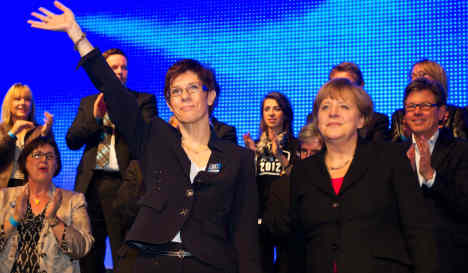In the first of three quick-fire votes in eight weeks, the pro-business Free Democratic Party (FDP) was kicked out of the state assembly in Saarland, winning just 1.2 percent, according to provisional official results.
The party was already kicked out of five state parliaments last year after also failing to reach the required five percent to secure parliamentary representation.
Merkel’s conservative Christian Democratic Union (CDU), which has governed in a national coalition with the FDP since 2009, retained its position as the state’s strongest party, winning 35.2 percent.
CDU General Secretary Hermann Gröhe called it a “day of great joy for Saarland and for the CDU”.
The main opposition Social Democrats (SPD), which had been polling neck-and-neck with the CDU, failed to do as well as expected but saw a marked improvement on their 2009 result, with 30.6 percent.
SPD head Sigmar Gabriel said he viewed the result both “laughing and crying”.
The result sees the state poised to enter a grand coalition with the SPD. Kramp-Karrenbauer called the result a positive signal for the CDU on the national level.
“The people have got the state premier they wanted,” she said. Kramp-Karrenbauer said Merkel had called to congratulate her just minutes after the first forecasts were reported.
Kramp-Karrenbauer announced in January that she would dissolve the state’s three-way coalition, between her conservatives, the FDP and the Greens.
The collapse was caused by an ongoing internal strife within the local FDP, which had fatally undermined her government’s stability.
FDP General Secretary Patrick Döring sought to put on a brave face, looking ahead to two upcoming regional votes in May, despite the party now having been humiliatingly kicked out of six states since last year.
“We will show there that organised liberalism in both states is strong enough to have an important function in parliament and in responsibility,” he said after the Saarland vote.
Last year’s “super election” year saw Merkel’s party suffer an electoral setback in her home state of Mecklenburg-Western Pomerania in September.
But most humiliating for the CDU was a defeat to the Greens in March in the wealthy south-western state of Baden-Württemberg that the conservatives had ruled without interruption for nearly six decades.
However Merkel’s personal approval rating, as well as her CDU, has been riding high in polls of late, seemingly cheered by her leadership at the helm of Europe’s biggest economy, through the eurozone debt crisis.
“This close liaison between the CDU and SPD possibly anticipates the constraints which may result at federal level after the next general election,” the Süddeutsche Zeitung newspaper said on Monday.
The vote in the small south-western Saarland which borders Luxembourg and France will be followed by the more strategically important Schleswig-Holstein on May 6 and North Rhine-Westphalia (NRW) a week later.
After a gruelling seven regional votes last year, Merkel and her junior Free Democrats were only due to fight one in 2012, but that unexpectedly swelled to three after the sudden collapse of Saarland and NRW state governments.
As Germany’s most populous state with 18 million people and a major industrial base, NRW’s centre-left minority government fell after just 22 months over a budget dispute.
The state historically plays a big role in federal politics – in 2005, a lost vote in NRW prompted then chancellor Gerhard Schröder to call a snap federal election which he then lost to Merkel.
Kicking off the electoral season, Saarland, a small region of about 800,000 voters, called early elections after the coalition of FDP, CDU and Greens collapsed in January.
The far-left Linke party won just over 16 percent in Saarland, and the Pirate party, which burst on to the German political scene last September, won its second footing in a state parliament with 7.4 percent.
The Greens scraped back in with five percent.
The FDP peaked in the last national election, grabbing more than 14 percent of the vote and formed a coalition government with Merkel’s CDU. But it has since seen its ratings dwindle amid internal squabbling and political strategies that have backfired.
DAPD/The Local/AFP/arp/hc


 Please whitelist us to continue reading.
Please whitelist us to continue reading.
Member comments